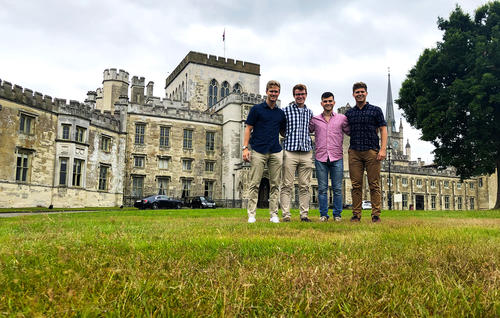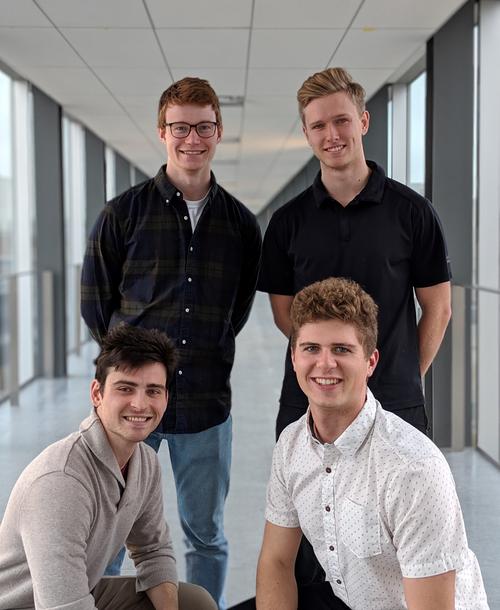
A castle fit for a startup accelerator
Recent alumni take their project to a prestigious business incubator in Henry the VIII’s former home

Recent alumni take their project to a prestigious business incubator in Henry the VIII’s former home
By Carol Truemner Faculty of Engineering
Better Bail for America (BB4A) team members in front of Henry the VIII’s former residence. The recent Waterloo alumni will be staying here for five weeks while they compete in the Hult Prize challenge.
In what could have a fairy-tale ending, four recent engineering alumni are advancing their school project at the Hult Prize Startup Accelerator located in a 16th century English castle.
The top six teams from the summer program will move on to the Hult final round this September at the United Nations in New York City for the chance to win $1 million and mentorship from the international business community. Two years ago Epoch, a University of Waterloo team that developed a mobile marketplace to better connect refugees to the community, made it into the last round.
The project the four new Waterloo graduates have taken to this year’s Hult startup accelerator is called Better Bail for America (BB4A), a solution to help prevent youth unemployment in the United States by enabling young, employed, first-time offenders on minor charges to access crowdfunded, interest-free bail.
“We want to help youth keep their employment opportunities and not find themselves in a downward cycle,” says Copeland. “If you are stuck in jail on bail, you’ll most certainly lose your job because you’ll be missing days, weeks or even months of work before trial.”
Even if first-time offenders are able to get out of jail, they often take a plea deal that usually results in a criminal record, explains Copeland.
“A lot of times, people will take a plea deal even if they aren’t guilty of a crime and that could mean very poor job prospects in the future,” he adds.

BB4A team members are clockwise from bottom left: Rareș Topor-Gosman, David Ferris, Mitchell Catoen and Devon Copeland.
The BB4A team members came up with the idea for their project last year in BET420, a fourth-year social entrepreneurship course offered through the Conrad School of Entrepreneurship and Business. The course’s social curriculum is designed around the Hult challenge each fall selected by former U.S. President Bill Clinton to create an innovative social enterprise that addresses the problem.
BB4A’s project topic turned out to be a perfect fit with the issue of youth unemployment, the focus of the 2019 international Hult challenge.
BB4A advanced to the Hult Mexico City regional finals held in March. The team’s first place victory in Mexico came with a coveted spot in the Hult startup accelerator.
Going beyond the classroom
The BB4A team chose to focus its attention on the problem of coming up with bail money for first-time offenders south of the border because the issue is so large.
“The U.S. has about three per cent of the world’s population, but about 25 per cent of the world’s incarcerated people,” says Copeland. “The U.S. is also only one of two countries that has a cash bail system where private bail bondsmen can essentially pay your bail for you and add a charge to their service.”
Team members recently met with bail charities in the U.S. and plan to follow up on their findings after they return from England.
Roopa Reddy, the lecturer with the Conrad School who oversees the Hult Prize competition at Waterloo, says BB4A came up with a unique response to a difficult challenge, demonstrating what can happen when technical skills and critical, creative thinking come together.
“This team's commitment and growth, well beyond the classroom, has been impressive to witness,” says Reddy. “Opportunities such as BET420 and the Hult Challenge have the potential to expand the range of impact Waterloo students have in their careers, providing the space and tools to tackle pressing social problems outside a conventional technical focus.”

Read more
How Doug Kavanagh’s software engineering degree laid the foundation for a thriving career in patient care

Read more
Redefining capstone learning by bringing students, faculty and community partners together to tackle real-world challenges

Read more
Here are the people and events behind some of this year’s most compelling Waterloo stories
Read
Engineering stories
Visit
Waterloo Engineering home
Contact
Waterloo Engineering
The University of Waterloo acknowledges that much of our work takes place on the traditional territory of the Neutral, Anishinaabeg, and Haudenosaunee peoples. Our main campus is situated on the Haldimand Tract, the land granted to the Six Nations that includes six miles on each side of the Grand River. Our active work toward reconciliation takes place across our campuses through research, learning, teaching, and community building, and is co-ordinated within the Office of Indigenous Relations.